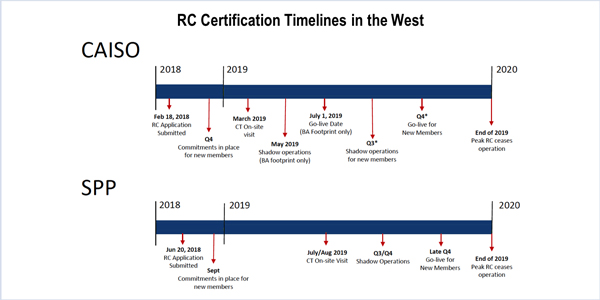By Tom Kleckner
CALGARY, Alberta — Where once there was one, there will now be several players offering reliability coordinator (RC) services for most of the Western Interconnection.
How many RCs there will be, and who they are, should come into better focus on Sept. 4. That’s the unofficial deadline NERC and the Western Electricity Coordinating Council (WECC) have placed on Western balancing authorities and transmission owners to declare their RC.
The only certainty is that it won’t be Peak Reliability, which has been providing the RC function for the entire interconnection except Alberta since WECC was bifurcated in 2014, with WECC retaining Regional Entity functions. Peak announced last month that it will wind down its services by the end of 2019, having determined it will be financially unable to compete with CAISO’s and SPP’s RC services.
“Things have been moving quickly,” WECC CEO Melanie Frye told NERC’s Board of Trustees last week. “We’re hoping to get a bit more clarity on where everybody is looking to go, and whether they’re intending to go with [CAISO] or SPP, or whether some other option will emerge.
“That will allow us to see where the seams start to emerge and whether it will result in swiss cheese, where you have a small BA choosing one RC provider, but everyone else around them choosing another,” she said during the board’s Aug. 16 meeting.
Both CAISO and SPP have been aggressively pursuing potential members. CAISO said in January it will become its own RC and offer that function to other Western entities. SPP, which still hopes to integrate some of the Mountain West Transmission Group into its RTO, has filed a request with WECC to provide RC services to two Western Area Power Administration companies and says it has received interest from 26 other parties. (See WAPA Formally Requests SPP’s RC Services.)
North of the border, the Alberta Electric System Operator (AESO) already handles its own RC services, while BC Hydro is “leaning to forming” its own RC in British Columbia, Frye said.
“Ultimately, it will be the BAs and the transmission owners that make sure they have a certified RC,” Frye said. “I think we’re making progress there. We’ve had very good engagement with all of the potential RC providers. At a technical level, a lot of that planning is starting to take place, and that’s very healthy.”
As the RE for the Western Interconnection, WECC has hosted a series of stakeholder forums to discuss a future with multiple RCs. The agency will be responsible for ensuring the RCs are certified to perform the registered function; ensuring the BAs and TOs are aligned with a certified RC; and monitoring compliance with reliability standards. WECC has scheduled on-site certification visits with CAISO for March and SPP next summer.
The loss of a Western-wide RC has several stakeholders concerned.
Utah Public Service Commissioner David Clark said it was his “personal hope” that whichever entity handles the RC function has “a governance structure that is independent and a process that’s transparent.”
“However this settles out, I hope the function will be performed in a way that is transparent … particularly to state energy advisers and state regulators and consumer advocates,” he said.
“I understand there are market considerations involved, but this has to be done very carefully,” warned NERC Trustee Dave Goulding, who chairs the organization’s Enterprise-wide Risk Committee. “As NERC, we don’t want to get into a situation where reliability is compromised.”
Not to worry, Frye said. “The focus on WECC’s work and NERC’s work will be on the intricacies of the interconnection and making sure that reliability across the seams with the RCs is maintained,” she told RTO Insider.
To that end, Frye, who is just completing her first month as WECC’s CEO, said the RE will be asking for a variance to the reliability standard that requires Western RCs to model the entire interconnection and all its remedial action schemes.
“We’ve started to engage this week at an executive level with the utilities, to ensure we have that connection-wide view,” she said.
Frye and WECC have the support of NERC and its CEO, Jim Robb, Frye’s predecessor at the RE. Robb joked that Frye is a “complete upgrade over the previous guy,” and he listed reliability coordination in the West as the second of four priorities that NERC is focused on in addressing industry risk.
“WECC and NERC are approaching this completely in lockstep around the changes that are happening in the West and [ensuring] that the resulting infrastructure works as well as possible, as with [the] same heightened performance as a single RC,” he said. “We’re working very hard with WECC to understand the needs they have for these RCs.”
CAISO has notified WECC that it intends to seek certification as an RC. Frye said the ISO intends to go live within its BA footprint on July 1, 2019, and it will add its new members later in the fourth quarter. CAISO is meeting with Peak to coordinate data exchange and operations.
SPP also plans to go live with its RC functions in the last quarter of 2019. The RTO already has a West-wide model in its energy management system.
“SPP is proceeding along a slower timeline, but obviously, both need to be up and running before the December date Peak has announced,” Frye said.







